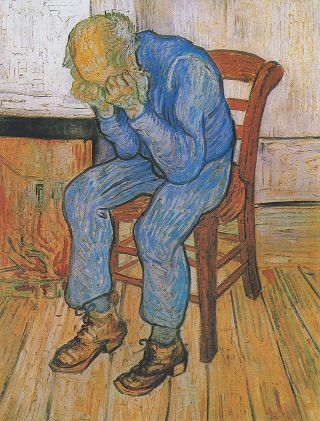Depression
The Conflation of Chronic Sadness With Major Depression
Long-term unhappiness is frequently misdiagnosed and improperly medicated.
Posted May 30, 2023 Reviewed by Abigail Fagan
Key points
- Chronic psychological distress is now likely to be misdiagnosed as major depression.
- Drug companies may push the use of antipsychotics over antidepressants because the latter are mostly generic.
- Pervasiveness, persistence, and pathology (difference from one's usual moods) define major depression.

In psychiatry, although depression is a symptom and not a disorder, these days the word is being thrown around loosely. Especially by doctors aligned with drug companies. Although it is difficult to prove that Pharma is still using marketing strategies like those made public in 2006, when Ely Lilly’s “Zyprexa documents” company memos were outed by reporter Alex Berenson in the New York Times, to all appearances they continue.
It clearly is in the interest of drug companies to conflate chronic psychological unhappiness — which is fairly common — with major depression so they can sell more drugs to people.
Since most antidepressants have gone generic, they are now instead pushing the use of newer dopaminergic, anti-psychotic medication. This is also being done with bipolar depression treatment.
Major depressive disorder (MDD) is now being over-diagnosed by relabeling what used to be called dysthymia as "mild" major depression. In fact, in the new list of psychiatric diagnoses, the DSM-V-TR, the term “dysthymia” has been replaced. It is now called Persistent Depressive Disorder. Also, there is one additional change that is telling. The only specific criteria for dysthymia in the switch to the new disorder that has been changed from the original is “The disturbance is not better accounted for by MDD or MDD in partial remission” to “Criteria for Major Depressive Disorder (MDD) may be continuously present for 2 years, in which case patients should be given comorbid diagnoses of persistent depressive disorder and MDD."
As discussed below, although it is certainly possible to be chronically unhappy and then develop an episode of major depression, in the past the amount of time someone was unhappy did not figure into the diagnosis independently from actually meeting the criteria for MDD.
Drug companies do what they usually do here, enlisted academic psychiatrists to become “key opinion leaders” in order to push the new idea. At times, they have even advocated the use self report surveys designed to screen for major depression (therefore having a lot of people test positive who don’t really have the disorder — false positives) as diagnostic instruments. More people who need their medications.
In Pharma’s bid to replace even proper anti-depressant use in MDD so that their antipsychotics can be pushed, for a while now there have been new studies that claim that antidepressants don’t work. Despite the fact that there were a lot of studies in the past which showed that they did. When I look at these new studies, there is always evidence that the findings are questionable. In one case (below) most subjects had clearly been unresponsive to at least one antidepressant before the study started.
Anti-Psychiatry Groups Have Used Pharma Tricks to Argue That Antidepressants Are Ineffective
Ironically, these strategies have given anti-psychiatry groups evidence they can use to attack the field. They believe that antidepressants are nothing more than placebos. Nothing could be further from the truth, but psychiatry critics have seized on the above “research” articles that seem to show this to be the case.
Of course, it’s not always easy for clinicians to tell the difference between dysthymia and major depression in a given patient, but in most cases, it’s fairly straightforward. As I mentioned, it’s also possible to have both (double depression).
Another drug company trick to increase the diagnoses of MDD involves the fact that it is episodic; the periods when it is not present are called euthymia. This is a patient’s baseline state, in which they can have any behavior or psychological problem that people without the disorder can have. A good clinician will define a response to antidepressants as good if the patient returns to their baseline. They don’t have to be in a good mood to have had a good response, but may just need psychotherapy like any other dysthymic patient.
Nonetheless, many of these patients who have double depression are mislabeled in the literature as “treatment resistant,” which means that docs are encouraged to add still more drugs to antidepressants to “augment” them. There are of course patients who actually are treatment resistant and need this augmentation, but in my 45 years of practice, this was a relatively small contingent.
Major Depression Is Pervasive, Persistent and Pathological
Briefly and in an oversimplified manner, distinguishing the two disorders has to do with the “three P’s” — persistence, pervasiveness, and pathological. (You can tell if a study employs the correct definition by seeing how the diagnosis was made with their subjects). The three P’s are emphasized in an excellent diagnostic interview called the SCID.
Persistent: This is the duration criteria. An episode has to last at least two weeks. Admittedly, the two-week criteria is arbitrary but is put in so clinicians don’t make the diagnosis after too short a period. The “everything is bipolar” crowd also routinely ignores the duration criteria.
Pervasive: The symptoms have to be present nearly all day every day no matter what is going on in a patient’s life or who they are talking to. This means that if a patient were to win the lottery, it wouldn’t cheer him up all that much.
Pathological: This means that the ways that the patients react to any stress are different from the way they might react if they were not in an episode. See the lottery statement. Also, if a lover were to, say, break their heart, this would not always make a whole lot of difference in how bad they feel.
Good psychiatrists not only know how to take a complete bio-psycho-social history but actually still do it.
References
Lexchin, J. “Key Opinion Leaders and Control of Knowledge," in Allen, D. and Howell, J. Groupthink in Science. New York, NY: Springer, 2020
First, M.B., Williams, J.B.W., Karg, R.S., and Spitzer, R.L. Structured Clinical Interview for DSM-5® Disorders—Clinician Version (SCID-5-CV). Washington DC: American Psychiatric Association Publishing, 2016.
Sachs, G.S., et. al. "Effectiveness of Adjunctive Antidepressant Treatment for Bipolar Depression." N Engl J Med 356, 1711-1722, 2007.




